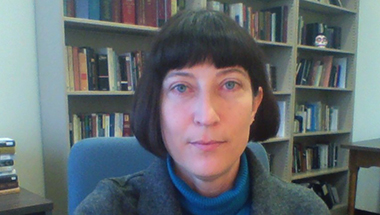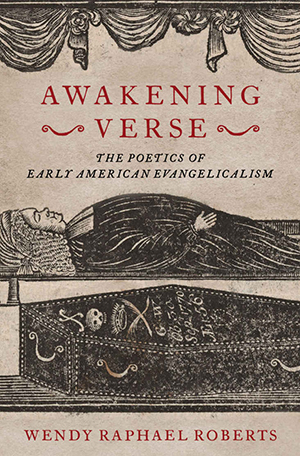A Literary Historian Uncovers the Presence and Power of Early American Evangelical Poetry
 |
|
Literary historian Wendy Roberts, author of Awakening Verse: The Poetics of Early American Evangelicalism. |
ALBANY, N.Y. (Aug. 25, 2020) — As a doctoral student at Northwestern University, Wendy Roberts sought to understand the evangelical poetic tradition that 18th century Black poets such as Phillis Wheatley and Jupiter Hammon were both writing into and critiquing.
Her only problem was that there did not exist a scholarly acknowledgement that this evangelical poetic tradition existed. Little regard was being given the role of poetry in early American culture, and much less upon the profound part it played in the revival movement of evangelicalism.
With her book Awakening Verse: The Poetics of Early American Evangelicalism (Oxford University Press, July, 2020), the first history of early American evangelical non-hymnal poetry, this gap in literary history has been filled. Roberts reveals that such poetry was a “primary actor” in the creation, adaptation and maintenance of evangelical culture.
Roberts, an assistant professor of English at UAlbany, found that evangelical verse was foundational to evangelical belief and culture because it infused believers with the emotions and feelings necessary for a close relationship with Christ, for living out tensions in theology and society, and for performing lay ministries.
“Poetics and aesthetics was at the heart of a new emphasis on experiential conversion,” she said. “The preeminent theologian of early evangelicalism, Jonathan Edwards, said that to have a sense of honey’s sweetness, you actually had to taste it. He said this is the same with real religion. He was saying not only that it has to be an experience, but that the conversion experience is of the aesthetic kind — of sweetness and beauty. To undergo conversion was to have an aesthetic experience of God.
 |
|
The book cover of Wendy Roberts' new book, released in July. |
“Additionally, because of that conversion, new converts had an obligation to pursue a certain kind of aesthetics — a low or common aesthetics that everyone could understand and appreciate.”
Roberts explicates in her book how different verse forms, such as the couplet, helped theology “inhabit people at the level of affect. This is especially important, because evangelicalism is a version of Christianity that distinguishes itself by its felt authenticity, or what evangelicals would say is ‘real’ religion. Any cultural or religious practice is more than rules, creeds, or ideas. It is a way of inhabiting and living in the world. Poetry helped make this theology feel right.”
This new chapter of literary history, detailed by Roberts, expands from the widespread scholarly understanding of the 18th century couplet solely epitomized by the Popian couplet, which expressed balance and enlightenment rationality.
As with evangelical teachings themselves, revival poetry disturbed the 18th century ideal of taste and social standing, even in the pulpit. In the American colonies, evangelicalism caused fights and split Congregational churches. It submitted that a well-respected and educated minister might not be converted. In its early days, it allowed Black people, white women and children to exhort and minister.
“They even preached outside, which was radical,” said Roberts. “Their poetry was just as audacious.” She noted that poetry would be delivered dramatically in the pulpit and was regarded as an even more effective tool for conversion than the new style of conversion-oriented preaching.
The reconstruction of a major literary form, long ignored, could not happen overnight. Roberts, who joined the UAlbany faculty in 2013, spent two fellowship leaves from the summer of 2015 through the end of 2016 to explore archives throughout New England, as well as in New York, Pennsylvania and even Manchester, England, for diaries, letter, commonplace books — personal collections of poems, proverbs, prayers, ideas, speeches, and more — and printed works that shed light upon her subject.
Among the items revealed was the significant role played by women poets. “Women were very active leaders and verse ministers — they were poet-ministers,” said Roberts. “And since poetry was thought to be more effective than even sermons by their male counterparts, we should take their poetry seriously in our histories of early evangelicalism and poetry.”
A subject she devotes a chapter to and is continuing to research as a current project is Phillis Wheatley, a slave in Boston, Mass., who became the first Black American woman to publish a book of poetry. Roberts’ book observes how Wheatley moved between revivalist verse and the more dignified style of Christian belletrism, revealing “her subtle negotiations between pro- and anti-revivalists and their respective notions of aesthetic taste, soteriology and anthropology.”
In addition to demonstrating how “literature and religious experience are deeply entwined, and that entanglement is important to American history,” Roberts work exposes the ubiquitous presence of poetry in everyday colonial American life, from households to coffee houses and pulpits to street corners. “Evangelicals were both influenced by and helped to produce this pervasive verse culture,” she said.
![]() For more news, subscribe to UAlbany's RSS headline feeds
For more news, subscribe to UAlbany's RSS headline feeds
A comprehensive public research university, the University at Albany-SUNY offers more than 120 undergraduate majors and minors and 125 master's, doctoral and graduate certificate programs. UAlbany is a leader among all New York State colleges and universities in such diverse fields as atmospheric and environmental sciences, business, education, public health,health sciences, criminal justice, emergency preparedness, engineering and applied sciences, informatics, public administration, social welfare and sociology, taught by an extensive roster of faculty experts. It also offers expanded academic and research opportunities for students through an affiliation with Albany Law School. With a curriculum enhanced by 600 study-abroad opportunities, UAlbany launches great careers.


